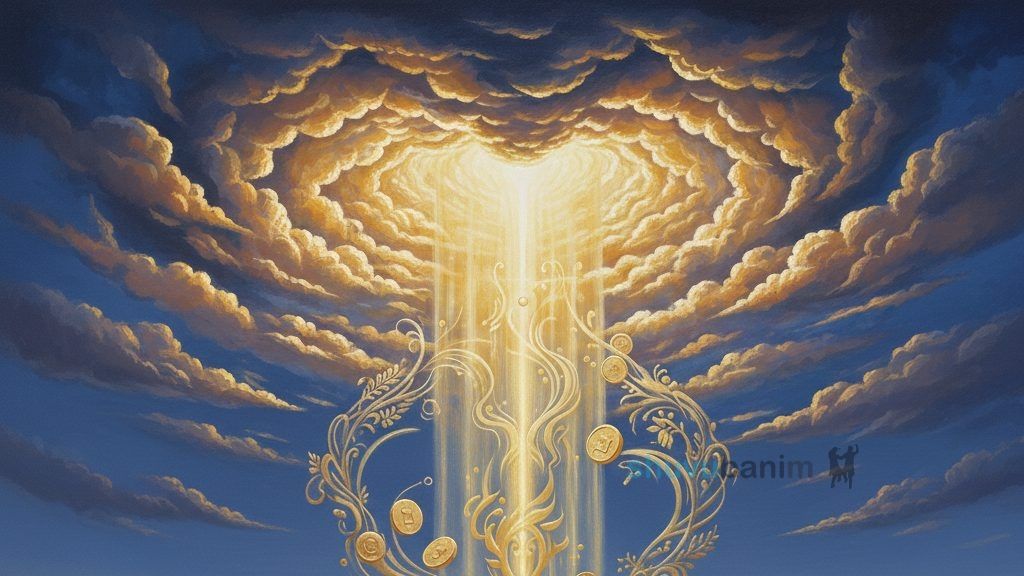During the twelve months' duration of the mabul, the Heavenly planets did not operate in order. The inhabitants of the Tevah therefore could not tell from sun or moon whether it was day or night. Only the precious stones which Noach had brought into the Tevah served as an indication of the time. When they shone, the tevah's inhabitants knew it was night; when they dimmed, it was day.
The Tevah floated securely like a ship in the ocean, while the world around it was transformed into a tremendous no-man's land of water. It rained heavily for forty days. Each raindrop which Hashem sent down was previously boiled in Gehinnom. The rain was so hot that people's skin peeled on contact with it. The drops did not consist only of water, but also of fire. In addition to the rain from above, all the wells and fountains of the earth opened up and poured forth boiling hot water. The giants of the Generation of the Flood had believed that they could prevent the wells from overflowing by merely stepping on them, but the water was so hot that this plan failed. What did this cruel generation do? They took their smallest children and put them into the opening to seal it. When the water continued to gush out, they placed one child after another at the opening of the fountain to save themselves. Where it not for the fire and water from above, they would have survived.
The water reached fifteen amot (30 feet) above the highest mountain tops, because this generation had sneered, We are giants, fifteen amot high, and if there will ever be a flood, we will stand on the mountain tops and be safe!" Now the water level was above their heads and they drowned.
The water of the mabul wore down the heaviest substances. Only the fish survived, because they had not sinned like the other creatures. Some say, the flood did not affect the sea at all. This was because G-d had given the fish a special blessing, as referred to in Bereishit so they did not die in the flood. They escaped to the depths of hte sea, where the water remained cool.
The flood did not cover Eretz Yisrael, not even in inhabited areas. The residents of the Holy Land did not die by drowning, but from the heat of the waters of the flood. The water was boiling hot; it made the entire world like a furnace, killing all air-breathing creatures. (Zevachim, loc. cit.) G-d wrought another miracle for Noach. The waters of the flood were boiling hot, since it had been decreed that many of the sinners should be boiled alive. But in the vicinity of the Tevah, the waters were cool and pleasant. This was done for the benefit of Noach. (Pirkei Rabbi Eliezer; Zevachim 113)
Of all the creatures on earth, man died last. G-d delayed his doom as long as possible, giving him a chance to repent. (Bachya)
All human bodies totally disintegrated. Not a single bone was left intact, not even the smallest luz at the lower end of the spine (some say at the top end, depending on tradition).
The emperor Hadrian asked Rabbi Yehoshua ben Chananya, "From which part of the body will G-d in future revive the dead?" "From the spinal bone luz." answered Rabbi Yehoshua. "How do you know?" he questioned. "Bring me such a bone and I shall prove it," replied Rabbi Yehoshua. When the bone Luz was brought to Rabbi Yehoshua, he demonstrated to the emperor how although he ground it in a mill, it would not be crushed. He threw it into the fire and it did not burn. Neither did it dissolve in water. Finally Rabbi Yehoshua brought a hammer and struck the bone. The hammer cracked and the bone survived. (Bereishit Rabbah)
When a man dies, his bone luz is preserved, in order to form the basis from which the body will be reconstructed at the time of Techiyat HaMetim (Resurrection of the Dead). But the Generation of the Mabul was so wicked that not one bone of their skeleton remained, net even the bone luz. None of them will be restored to life at the time when the dead will rise from their graves. They will not even be among those who will be revived to be judged and then doomed, the memory of the Generation of the Mabul was blotted out from the world.
-----------
Source: Midrash Says; Me'am Lo'ez



















